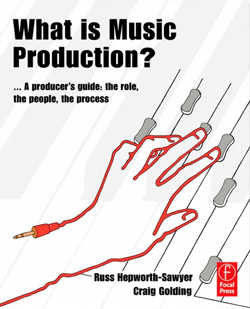
By energy and vibe, we mean a sense of positivity or sense of enjoyment.
Certainly we acknowledge that some great and very creative results can come from a negative situation (just consider the personal relationship issues surrounding the Fleetwood Mac Rumours album, for example).
However, in general the recording session should be an enjoyable, positive, and creative experience. If people are not enjoying the process, then the producer needs to identify why and seek to address the issue.
In many ways the initial vibe for the session is created and set by the producer, something which at a later point the artist and musicians will pick up on and feed off of. The producer really needs to have his finger on the pulse of the session.
An interesting psychological perspective and methodology to consider while discussing this topic comes from that of producer Brian Eno.
The Art of Record Production by Richard James Burgess (2005) describes how Eno developed a set of mood cards for use when artists are seemingly at a creative dead-end. These cards pose statements designed to provoke a response of some kind in order to restart or reroute the creative process.
Allowing time and room to experiment can be a very liberating and fruitful approach for both the artist and producer.
Many anecdotes can be told by seasoned professionals whereby experimentation and serendipity has led to a pleasing result.
However, creativity has inherent dangers if left to run wild, and this is where the producer needs to have control over the session and be able to discern a good idea from a bad one. Being able to perceive and judge how a situation is unfolding and what the possible result will be is an essential skill to have.
This is where industry names such as Brian Eno and Trevor Horn have received much praise from artists they have worked with. Not all experimentation leads to the desired outcome, so the producer has a responsibility for quality control as it were, making sure that whatever is being created still fits the overall aim of the session.
This section could quite easily turn into a lesson in psychology (as could many of the sections within this book) but this is not really our aim here.
Therefore, while contemplating the topic of creativity and confident creation we’d suggest considering the following four simple mindsets or approaches, which may prove useful within the studio session.
We’ll call them director, catalyst, nurturer, and psychologist; of course much depends on the situation you find yourself in and as such these mindsets will become interleaved as the sessions take place. Being flexible is key.
All of the approaches above and discussion as to creating a creative environment are generic to all producer roles or types and apply equally, no matter the skill set, knowledge, and expertise.
However, if as an individual you possess the practical and theoretical musical skills, then your creative input during the session can potentially be quite considerable. Your musical ability to play, compose, and arrange will allow you to be a more tangible part of the creative musical process.
This may be as basic as suggesting a slight alteration to the lyrics or the melody, through to playing or arranging and introducing new parts or tracks to the song to further enhance the production.
The fine details of all of this will depend on the nature of the artist or band you may be working with and the way in which you have agreed to work together.
As ever, knowing when and when not to use these skills is important, as some artists or groups may be more independent in these areas than others.
This is the first segment in our series by Golding and Hepworth-Sawyer on audio production. Additional segments are available here.
To purchase What is Music Production? click on over to the Focal Press website.
Russ Hepworth-Sawyer is a sound engineer and producer with many years’ experience of all things audio and is a member of the Association of Professional Recording Services and the Audio Engineering Society; a Fellow of the Institute For Learning (U.K.); and a Director of the Music Producer’s Guild. Craig Golding is currently Course Leader for the Music Production degree program at Leeds College of Music in the U.K. and also has an active freelance career in sound engineering and production with over a decade’s experience working in the industry.
